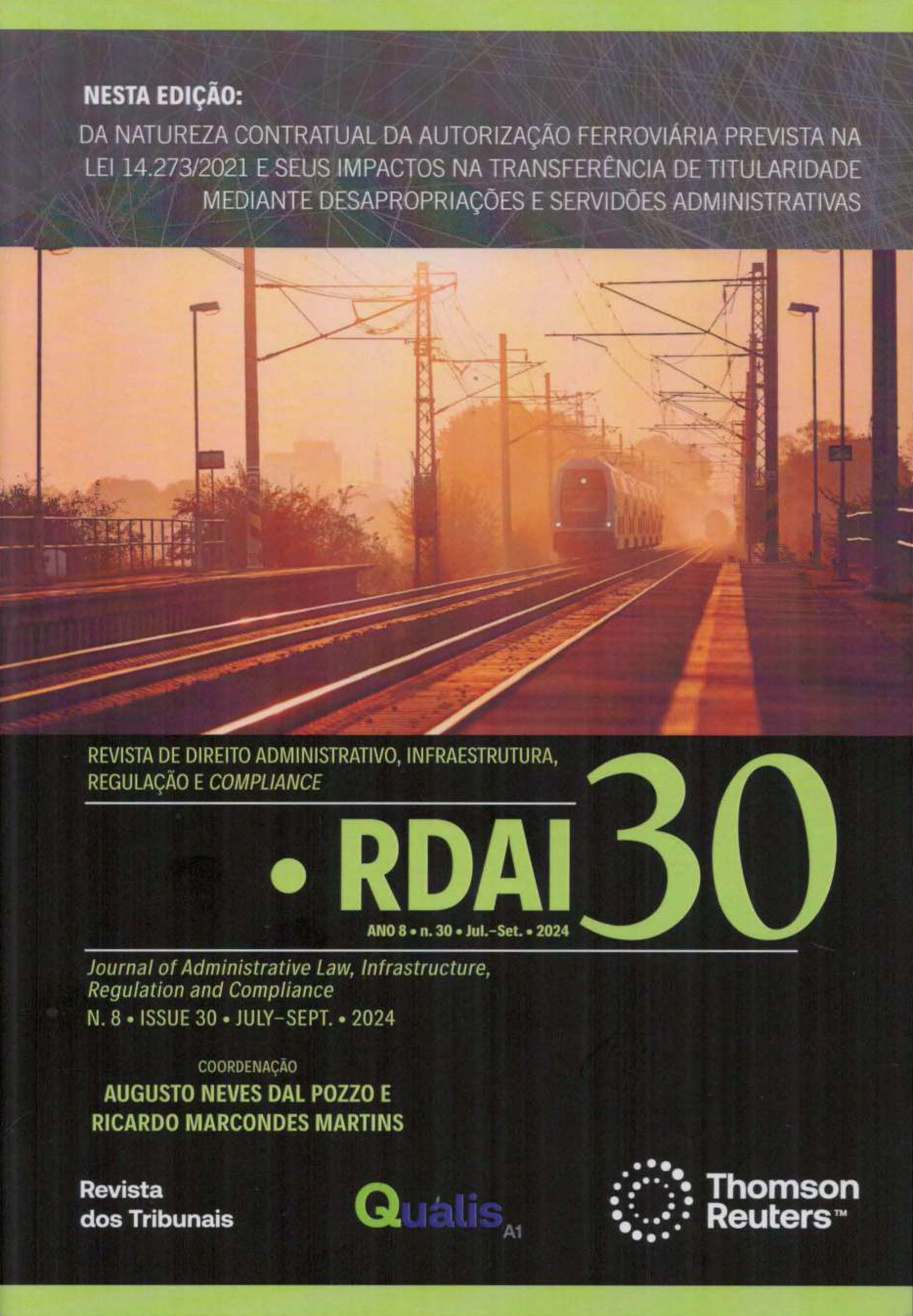Diseñando gobernanzas: la ingeniería social de las decisiones colectivas
DOI:
https://doi.org/10.48143/rdai.30.vidalPalavras-chave:
Gobernanza – Administración Pública – Coordinación – Cooperación – Formación de GruposResumo
La gobernanza es un concepto político cuyo contenido legal se puede descifrar al estudiar las normas jurídicas que estructuran las decisiones colectivas que toman las administraciones públicas. El objetivo de este artículo es identificar las reglas básicas y fundamentales para el diseño de gobernanzas. Con ese fin se acuden a algunos ejemplos de gobernanzas colombianas en distintos sectores de política pública como la planeación, el desarrollo de proyectos, el medio ambiente y la prestación de servicios públicos. El propósito es aportar a la construcción de un enfoque técnico y transdisciplinar en el diseño de gobernanzas.
Downloads
Referências
ACKOFF, Robert. OR: after the post mortem. System Dynamics Review, n. 17. 2001. DOI: https://doi.org/10.1002/sdr.222
AXELROD, Robert. The Evolution of Cooperation. Nueva York: Basic Books, 1981. DOI: https://doi.org/10.1126/science.7466396
AXELROD, Robert. The Complexity of Cooperation: Agent-Based Models of Competition and Collaboration. Princeton: Princeton University Press, 1997. DOI: https://doi.org/10.1515/9781400822300
BARNES, Javier (ed.) Innovación y reforma en el Derecho administrativo. Sevilla: Editorial Derecho Global, 2006.
BARNES, Javier. Tres Generaciones del Procedimiento Administrativo. Derecho PUCP, n. 67. 2011. DOI: https://doi.org/10.18800/derechopucp.201102.003
BUCHANAN, James; TULLOCK, Gordon. The Calculus of Consent. Indianapolis: Liberty Fund, 1999.
BUSH, Paul. The Theory of Institutional Change. Journal of Economic Issues, n. 21. 1987. DOI: https://doi.org/10.1080/00213624.1987.11504697
COVILLA MARTÍNEZ, Juan Carlos. Coordinación y autonomía en la administración pública. Pamplona: Aranzadi. 2019.
CUEVAS, Homero. Proceso Político y Bienestar Social. Bogotá: Universidad Externado de Colombia, 1998.
DE SCHUTTER, Olivier; LENOBLE, Jacques. Reflexive Governance: Redefining the Public Interest in a Pluralistic World. Oxford: Hart Publishing, 2010.
DEWEY, John. (1946). The public and its problems. An essay in political inquiry. Chicago: Gateway Books.
HENRICH, Joseph. Cultural group selection, coevolutionary processes and large-scale cooperation. Journal of Economic Behavior & Organization, n. 53. 2004. DOI: https://doi.org/10.1016/S0167-2681(03)00094-5
KOOIMAN, Jan. Governing as Governance. Londres: Sage Publications, 2003. DOI: https://doi.org/10.4135/9781446215012
MARTÍ, José Luis. LaRepública deliberativa. Una Teoría de la Democracia. Madrid: Marcial Pons, 2006. DOI: https://doi.org/10.2307/jj.2321989
OLAYA, Camilo. Más ingeniería y menos ciencia por favor. XI Congreso Latinoamericano de Dinámica de Sistemas. 2013.
OLAYA, Camilo; GÓMEZ QUINTERO, Juliana. Conceptualization of Social Systems: Actors First. Proceedings of the 34th International Conference of the System Dynamics Society. 2016.
OSTROM, Elinor. Governing the Commons. The Evolution of Institutions for Collective Action. Cambridge: Cambridge University Press, 2015. DOI: https://doi.org/10.1017/CBO9781316423936
PAREJO ALFONSO, Luciano; VAQUER CABALLERÍA, Marcos. Estudios Sobre el Procedimiento Administrativo. Valencia: Tirant lo Blanch, 2020.
PROVAN, Keith; KENIS, Patrick. Modes of Network Governance: Structure, Management, and Effectiveness. Journal of Public Administration Research, n. 18. 2007. DOI: https://doi.org/10.1093/jopart/mum015
SCHARPF, Fritz. Games Real Actors Can Play: Actor-Centered Institutionalism in Policy-Research. Boulder: Routledge, 1997.
SCHARPF, Fritz. The joint-decision trap: lessons from German federalism and European integration. Public Administration, n. 66. 1988. DOI: https://doi.org/10.1111/j.1467-9299.1988.tb00694.x
SIMON, Herbert. The Sciences of the Artificial. Cambridge: MIT Press, 1996.
VENNIX, Jac. Group model-building: tackling messy problems. System Dynamics Review, n. 15. 1999. DOI: https://doi.org/10.1002/(SICI)1099-1727(199924)15:4<379::AID-SDR179>3.0.CO;2-E
VON BEYME, Klaus. El Federalismo en la República Federal Alemana. Revista de Estudios Políticos. n. 17. 1980.
Downloads
Publicado
Como Citar
Edição
Seção
Licença
Copyright (c) 2024 Revista de Direito Administrativo e Infraestrutura | RDAI

Este trabalho está licenciado sob uma licença Creative Commons Attribution-NonCommercial-NoDerivatives 4.0 International License.
(CC BY-NC-ND)
Este é um resumo (e não um substituto) da licença
Regras para publicação
Direitrizes Editoriais
Direitos e Deveres
Errata e Retratação
Preservação e Plagiarismo
Revisão e Avaliação





